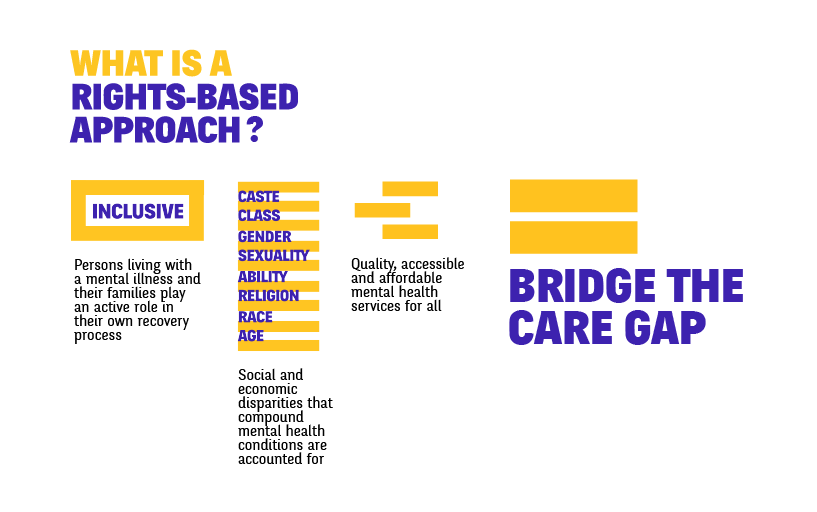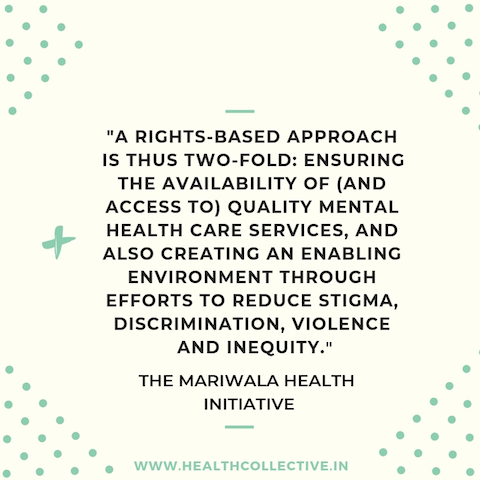What is a Rights-Based Approach to Mental Health?
By The Mariwala Health Initiative
This post seeks to explain what a Rights-Based Approach to Mental Healthcare looks like, and why it is important.
A History of Rights-Violations
Human rights violations in mental health care have reached such epic proportions that practitioners refer to it as an ‘unresolved global crisis’. In many countries, including India, people are denied their basic citizenship rights – such as opening bank accounts or voting in elections or involuntary incarceration in mental health institutions. Other basic rights-violations include lack of consent and confidentiality. Persons living with mental health issues are thus frequently excluded from decision-making processes on issues that affect them. Many persons living with mental illness are systemically excluded from mainstream activities—attending school or finding employment— causing further isolation and compounding mental health issues.
ALSO READ: KNOW YOUR RIGHTS: MENTAL HEALTHCARE ACT 2017
Bio-Medicalisation of Mental Health Services
Besides excessive rights-violations, mental health services are notorious for disproportionate medicalisation. This heavy reliance on medication to treat mental health issues that actual stem from social inequities — is ineffective. The impact that unequal power relationships, violence and discrimination have on a person’s mental health cannot be addressed through medication alone. Research indicates that mental health issues are linked to early childhood adversities, inequalities, violence, poverty or social exclusion. The current mental health care model doesn’t account for a person’s context, or recognise that psycho-social distress is also a result of discrimination and marginalisation. Mental health practitioners are therefore rightly calling for a shift in “focusing on chemical imbalances to focusing on power imbalances and inequalities”.

A Rights-Based Approach
It is important to explicitly shift towards a rights-based approach to mental health that focuses not just on symptoms but also on a person’s environment as well. A rights-based approach is thus two-fold: ensuring the availability of (and access to) quality mental health care services, and also creating an enabling environment through efforts to reduce stigma, discrimination, violence and inequity. Another facet of a rights-based approach is the individual’s agency. In mental health this includes ensuring that persons living with a mental illness and their families play an active role in their own recovery process and not just remain passive recipients of services. Thus, a rights-based approach to mental health emphasizes participation of those living with a mental illness, and focuses on marginalized communities.

Bridge the Care Gap Campaign
Recognising the high incidence of human rights violations in mental health care and over-medicalisation of mental health services, mental health practitioners and advocates have launched a campaign to address both. ‘Bridge the Care Gap’ campaign calls on the Indian government to proactively safeguard the rights of persons living with a mental illness, ensure their full-participation in decision-making processes concerning their own health, address social and economic disparities that compound mental health conditions and provide quality, accessible and affordable mental health services.
For more campaign details visit: www.bridgethecaregap.com
Disclaimer: Views Expressed are personal.
Material on The Health Collective cannot substitute for expert advice from a trained professional. If you would like to share your story, do write to us here or tweet us @healthcollectif
Feature Image: Art by Ameya Dabholkar





Pingback: Unravel: Improv That Shows Us How to Listen